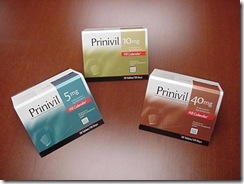These drugs belong to a group of drugs for high blood pressure called angiotensin converting enzyme (ACE) inhibitors. Capoten, Prinivil, and Vasotec are the preferred ACE inhibitors because they have been on the market the longest.
ACE inhibitors are effective drugs for the treatment of high blood pressure (hypertension) and congestive heart failure in older adults. After a heart attack, treatment with some ACE inhibitors prevents subsequent heart failure and reduces morbidity and mortality (the rate of disease-related sickness and death). The American Heart Association modified secondary-prevention guidelines recommend that ACE inhibitors be "considered for all patients with vascular  disease."
disease."
In people with high blood pressure and kidney disease, ACE inhibitors, along with water pills, slow progressive kidney failure. ACE inhibitors may also be the preferred class of drugs to control blood pressure in those people with kidney damage from diabetes. However, ACE inhibitors can cause dangerous adverse effects such as bone marrow depression and, ironically, kidney disease itself, and therefore should be taken in lower doses by older adults. This may amount to less than one-third the doses used in the past. In general, patients are more likely to suffer harmful effects from ACE inhibitors if they have decreased kidney function, including dehydration. Since older adults generally have some decrease in kidney function, these drugs may be especially dangerous for them. In older adults, therefore, use of an ACE inhibitor requires a careful balancing of the risks and benefits by the patient with his or her physician.
In addition, patients taking a diuretic (water pill) should be watched carefully or, at their physician’s discretion, be taken off that medication when an ACE inhibitor is started. Vasotec decreases the potassium loss caused by thiazide-type diuretics. Patients using potassium-sparing drugs (see below) should not use ACE inhibitors. Potassium-sparing diuretics, potassium supplements or salt substitutes containing potassium may lead to significant increases in serum potassium, which in extreme cases can be fatal.
The Food and Drug Administration (FDA) issued a public health advisory in 2006 concerning the increased possibility of birth defects in children born to mothers who took angiotensin-converting enzyme (ACE) inhibitors during the first trimester of pregnancy.
Problems with the possibility of birth defects when ACE inhibitors are used in the second and third trimesters are well known. All marketed ACE inhibitors carry a black box warning in their professional product labels, or package inserts, but this is the first study to raise concerns about use in the first trimester.
At times when using ACE inhibitors, the blood pressure goes too low, especially with the first dose. Older people are more likely to be sensitive to low blood pressure. A rare but potentially life-threatening reaction is angioedema, a sudden swelling of the face, lips, and particularly the tongue, which may last three days. While this reaction usually occurs with the first dose, it can occur years later. Once angioedema occurs, all ACE inhibitors should be stopped.In general, if you are over 60, you should be taking less than the usual adult dose. Since Vasotec stays in the body longer than Capoten, its adverse effects may last longer.
Intestinal angioedema has been reported in patients treated with ACE inhibitors. These patients presented with abdominal pain (with or without) nausea and vomiting; in some cases there was no prior history of facial angioedema.
If you have high blood pressure, the best way to reduce or eliminate your need for medication is by improving your diet, losing weight, exercising, and decreasing your salt and alcohol intake. Mild hypertension can be controlled by proper nutrition and exercise. If these measures do not lower your blood pressure enough and you need medication, hydrochlorothiazide (ESIDRIX, HYDRODIURIL, MICROZIDE), a water pill, is the drug of choice, starting with a low dose of 12.5 milligrams daily. It also costs less than other blood pressure drugs.
If your high blood pressure is more severe, and hydrochlorothiazide alone does not control it, the best treatment is a combination of hydrochlorothiazide and a second type of drug called a beta-blocker, such as propranolol (INDERAL, INDERAL LA). If you can’t take a drug in the beta-blocker family, another family of high-blood-pressure-lowering drugs may be added to your treatment. In either case, your doctor would prescribe the hydrochlorothiazide and the second drug separately, with the dose of each drug adjusted to meet your needs, rather than using a product that combines the drug in a fixed combination.
Whatever drugs you take for high blood pressure, once your blood pressure has been normal for a year or more, a cautious decrease in dose and renewed attention to nondrug treatment may be worth trying, according to The Medical Letter
An editorial in the British Medical Journal stated:
Treatment of hypertension is part of preventive medicine and like all preventive strategies, its progress should be regularly reviewed by whoever initiates it. Many problems could be avoided by not starting antihypertensive treatment until after prolonged observation....Patients should no longer be told that treatment is necessarily for life: the possibility of reducing or stopping treatment should be mentioned at the outset.
No comments:
Post a Comment